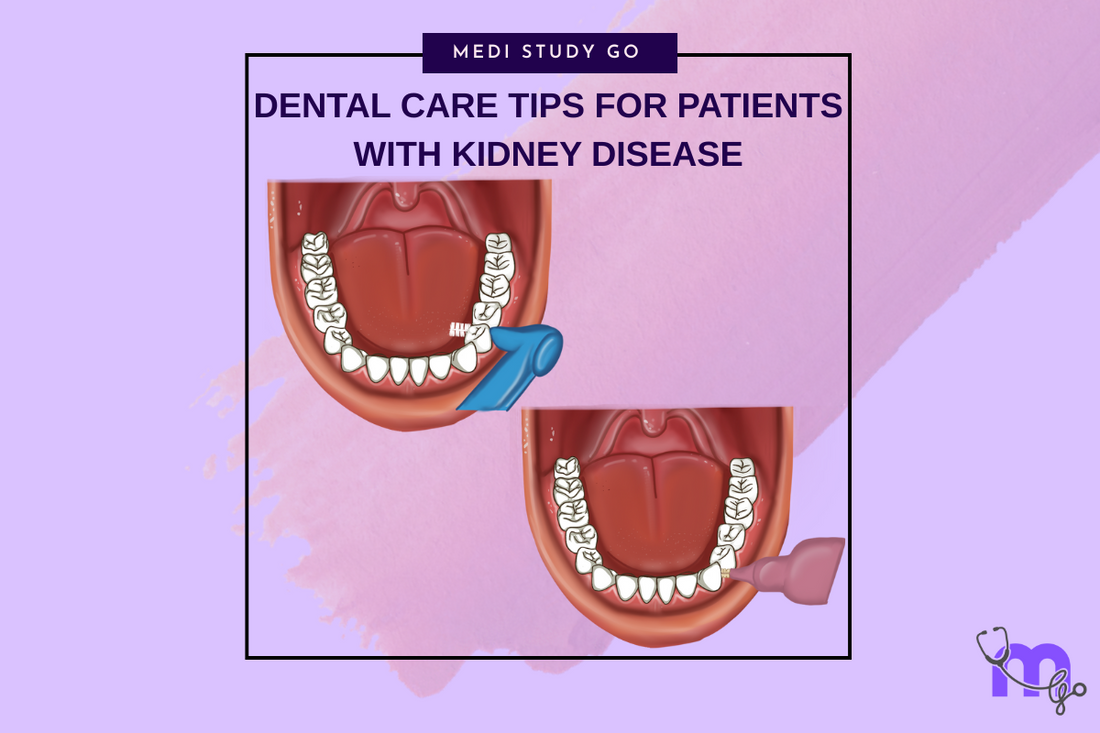Dental Care Tips for Patients with Kidney Disease
Medi Study Go
Related Resources:
- Renal Disease and Oral Health: The Critical Connection
- How Kidney Problems Affect Your Teeth and Gums
- Oral Health in Chronic Kidney Disease: What You Should Know
- Is It Safe to Visit the Dentist with Renal Disease?
- NEET Examination Guide: Renal Disease and Oral Manifestations
Patients with renal disease face unique challenges in maintaining oral health. For medical professionals studying for NEET MDS examinations, understanding these specialized care approaches is essential. This guide provides comprehensive dental care recommendations for kidney patients that both practitioners and patients can implement.
Why Specialized Dental Care Matters for Kidney Patients
Bilateral renal parenchymal disease and other kidney conditions significantly alter the oral environment. Patients may experience xerostomia (dry mouth), increased plaque formation, and compromised immune response. As emphasized in many NEET preparation books, these changes necessitate modified dental care approaches.
Understanding the Heightened Risks
Patients with kidney disease face increased risks of:
- Periodontal disease progression
- Dental caries development
- Oral fungal infections
- Delayed wound healing
- Medication-induced complications
NEET previous year question papers often test these connections, requiring students to understand both the pathophysiology and practical management approaches.
Daily Oral Hygiene Recommendations

Brushing Techniques
Patients with end-stage renal disease should follow these guidelines:
- Frequency: Brush at least twice daily, ideally after each meal
- Toothbrush selection: Soft-bristled toothbrushes to minimize gingival trauma
- Technique: Modified Bass technique with gentle pressure
- Duration: Two minutes minimum per session
- Toothpaste: Fluoridated toothpaste without strong flavorings that might irritate sensitive oral mucosa
For those preparing for dental examinations, these specifics might appear in NEET PYQ materials.
Interdental Cleaning Approaches
Regular interdental cleaning is crucial for patients with medical renal disease, who often have increased plaque accumulation:
- Water flossers on low settings for patients with bleeding tendencies
- Interdental brushes for larger spaces
- Regular dental floss for tight contacts, using the proper C-shaped technique
- Antimicrobial floss options for patients with recurrent infections
Tongue Cleaning Protocol
Patients with kidney disease often develop tongue coating (saburral tongue) that contributes to halitosis:
- Use a dedicated tongue cleaner rather than a toothbrush
- Clean gently from back to front
- Perform once daily, preferably in the morning
- Consider antimicrobial mouth rinses as adjuncts
Managing Dry Mouth (Xerostomia)
Xerostomia affects approximately 80% of patients with advanced kidney disease and requires specialized management:
Hydration Strategies
- Sip water frequently (within fluid restriction guidelines)
- Use sugar-free lozenges or gum to stimulate saliva
- Apply lip balm to prevent cracking of lips
- Consider humidifiers to increase environmental moisture
Saliva Substitutes
- Alcohol-free options to prevent further drying
- Products containing xylitol for additional caries protection
- Lubricating gels for nighttime relief
- Prescription saliva stimulants when appropriate
Students preparing for examinations should include these specific recommendations in their last minute revision materials.
Product Recommendations and Adaptations
Toothpaste Selection
- Fluoride content of 1450 ppm minimum
- Non-irritating formulations without strong flavorings
- Additional remineralizing agents like calcium phosphate
- Sodium lauryl sulfate-free options for sensitive mucosa
Mouth Rinses
- Alcohol-free formulations to prevent tissue irritation
- Chlorhexidine (0.12%) for short-term therapeutic use
- Essential oil rinses for longer-term maintenance
- Sodium bicarbonate rinses (1 tsp in warm water) for pH neutralization
Using a flashcard technique for study can help memorize these specific product recommendations.
Adaptations for Physical Limitations
Many patients with advanced kidney disease experience:
- Fatigue affecting oral hygiene performance
- Limited dexterity from peripheral neuropathy
- Reduced mobility affecting dental visit access
- Cognitive changes affecting compliance
Practical adaptations include:
- Modified toothbrush handles (thickened, weighted, or extended)
- Electric toothbrushes requiring less manual dexterity
- Assistive devices for flossing
- Caregiver assistance protocols when necessary
Diet and Nutrition for Oral Health
Dietary recommendations must balance renal dietary restrictions with oral health needs:
- Low-phosphorus calcium sources for dental remineralization
- Sugar substitutes to reduce caries risk
- Fibrous foods for natural cleaning when tolerated
- Adequate protein sources for tissue healing (within restrictions)
These balancing considerations frequently appear in NEET mock test scenarios.
Managing Common Oral Complications
Gingival Overgrowth
- Meticulous oral hygiene around enlarged tissues
- Modified brushing techniques for accessing subgingival areas
- More frequent professional cleanings
- Medication review with nephrologist when possible
Oral Infections
- Early recognition of fungal infection signs
- Prompt professional treatment for infections
- Preventive antifungal protocols when indicated
- Home care adaptations during active infections
Uremic Stomatitis
- Gentle oral hygiene during active lesions
- Avoiding irritating foods and products
- Professional debridement as tolerated
- Coordination with nephrologist to optimize dialysis
Coordination with Healthcare Team
Effective dental care requires communication with:
- Nephrologist regarding medication timing
- Dialysis center for appointment scheduling
- Primary care provider for antibiotic prophylaxis needs
- Oral medicine specialist for complex manifestations
This collaborative approach is emphasized in contemporary NEET tips and resources.
Patient Education Tools
Developing educational materials for kidney patients should address:
- Simplified oral hygiene instructions with visual guides
- Disease-specific oral complication warning signs
- When to contact dental versus medical providers
- Medication implications for oral health
A NEET revision tool might include templates for patient education development.
Conclusion
Dental care for patients with kidney disease requires specialized knowledge, tailored approaches, and close coordination with the medical team. For healthcare professionals, recognizing the unique needs of this population allows for more effective management and improved outcomes. By implementing these specialized dental care strategies, patients with kidney disease can maintain better oral health despite the challenges imposed by their condition.
For medical and dental students preparing for examinations, understanding these practical considerations provides context for the theoretical knowledge of renal disease oral manifestations, making for more comprehensive preparation and ultimately better patient care.